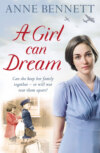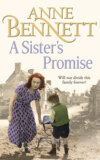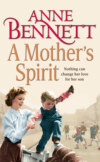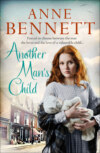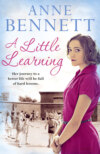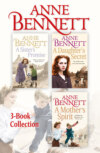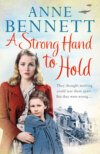Kitabı oku: «Love Me Tender», sayfa 3
Every night Barry would listen to the news reports, usually with Pat, often with young Michael and occasionally with Sean too. For a long time they’d discuss the news items together before dispersing.
No one now tried to convince themselves that the world wasn’t at crisis point. Barry and Michael had been making anti-tank rifles, and now they’d been put on to making Browning 303 machine guns. No one objected to the long hours put in; everyone seemed to realise it was a race against time, and there was a sense of inevitability during the spring and summer of that year.
The summer holidays dawned wet, miserable and dull, but when July gave way to August there was a heat wave and the temperatures were sometimes the highest they’d been for thirty years. ‘I wish we could go to the seaside,’ Lizzie complained one day to Carmel, who agreed. They’d never been but had heard it was grand.
The pavements seemed to radiate the heat, so that it shimmered above them and they were dustier than ever. Lizzie sat on the step and watched three little boys building dust castles, which they then destroyed with their toy cars, making a great deal of noise about it. Others huddled in groups over piles of marbles. One little girl, younger than Lizzie, pushed a pram with a fractious baby inside, while a bit further down the street, two older girls wielded a long, heavy rope while another girl skipped inside the loop. Lizzie wondered how they could be so energetic. She was so hot, her clothes were sticking to her body. ‘If we went to Cannon Hill Park, we could paddle at the sides of the lake,’ she suggested. ‘If Mammy would let us.’
‘We’d have to take Sheelagh and Matt too, at least,’ Carmel said.
‘Couldn’t we go on our own just once?’
‘You know full well we couldn’t.’ Carmel was older and wiser than her niece. ‘Sure, Bridie would play war if she found out.’
Suddenly Lizzie wasn’t sure if she wanted to go, and have Sheelagh goading and sneering at her. She wasn’t sure whether it wasn’t a better prospect to stay in the hot street and swelter. But in the end she went, and her mammy and Auntie Rose went too.
Kathy was also feeling restless and unsettled and a day out with the children was maybe just what she needed. Also she thought she’d ignored Rose’s baby daughter long enough; sure, it wasn’t Rose or Sean’s fault her baby had died.
They sat on a grassy incline overlooking the lake and watched the ducks and swans swimming between the circling rowing boats. The children had stripped to the bare minimum, as had many others, and were squealing and giggling as they played together. Nuala was practising the new art of walking and now and again would tumble over and chuckle to herself.
‘It’s hard to believe dreadful things are going on in other parts of the world on a day like this,’ Kathy remarked.
‘I know Sean’s really worried. Is Barry?’
‘Everyone’s worried. God, Rose, what if war comes and our husbands are called up and there are enemy planes in the sky?’
‘You don’t think it can be averted?’
‘Not now, it’s too late,’ Kathy said. ‘We heard it on the news, Hitler wants the town of Danzig, and if it’s given up to German control he has a corridor straight through to Prussia, cutting off Poland’s access to the sea. I don’t see them agreeing to it, do you?’
Rose shook her head sadly. She looked at her little boy Pete, now a sturdy three-year-old, and Nuala still a baby, and shivered, and yet she believed her sister-in-law. Sean said Barry had a better grasp of the world situation than many of the politicians, which came from all the reading he’d done while he was on the dole.
It was as the women and children made their way home that they came upon men digging trenches. ‘What are they doing?’ Danny asked.
Rose and Kathy exchanged glances. Everyone was aware of the policy of digging trenches in parks and other open spaces; it had been on the news, but to actually see it being done was dreadful.
‘What will they have us do? Cower in the mud like rats?’ Bridie had said scathingly.
‘Well, it will surely be better than nothing if you’re caught in a raid,’ Pat had retorted.
Kathy knew her brother was right and, as war was inevitable, and everyone knew that this time civilians everywhere would be targeted too, she should have felt reassured seeing the trenches being dug. Instead it filled her with dread. But she had to answer her small son. ‘They’re just digging,’ she said shortly.
Danny walked to the rim of the trench to look in. The two men digging were stripped to the waist, their backs gleaming with sweat. One of them grinned up at him and all the children began edging forward to see.
‘Come on now,’ Kathy snapped.
The children, even wee Pete, took no notice and edged closer to look in.
‘Pete,’ Rose called warningly. ‘Come on.’
Pete turned and looked but didn’t move, and when Carmel attempted to pull him towards his mother, he began to shout and struggle.
‘Come away out of that, the lot of you,’ Kathy yelled impatiently, and the children came reluctantly, all except Danny. He continued to stare at one of the men, who suddenly rubbed his dirty hand across his brow. Danny was very envious. He thought it would be great to do work like that – fancy being able to dig all day long!
‘Danny!’
Danny ignored his mother and rubbed his hand across his brow, imitating the man, who leant on his shovel and gave a bellow of laughter.
‘Just a minute, Mammy.’
‘I will not “just a minute”, my lad,’ Kathy said, marching over and grabbing her son by the arm. ‘For once in your life you’ll do as you’re bloody well told.’
‘Ah, missus,’ said the man in the trench, understanding Kathy’s mood far better than Danny did. ‘Let’s hope they’re not needed.’
‘Yes indeed,’ said Kathy, dragging her protesting son away. She couldn’t wait to get them home.
‘Mr Brady came from the school,’ Bridie told Kathy later that night. ‘While you were away at the park.’
‘They’re on holiday, what did he want anyway?’ she asked, surprised. The headmaster had called round: he’d never done such a thing before.
‘He was talking about the evacuation programme.’
‘They’re not being evacuated,’ Kathy said firmly. ‘I talked it over with Barry. I’ve got the cellar and I’m not sending my weans to live with strangers.’
‘Me neither. I told him I’d come into your cellar if there were air raids.’
Kathy knew she would, and however she felt about her sister-in-law, she couldn’t deny her shelter if the bombs came. ‘What did he say?’ she asked.
‘Well, he wasn’t pleased. He said the government wanted to empty the cities of children, but it had to be our decision.’
‘I wonder how many will go,’ Kathy said. ‘I mean, I wonder if they’ll close the school.’
‘Surely to God they can’t do that, they can’t leave our children running mad through the streets.’
‘We’ll have to wait and see,’ Kathy said.
It was Lizzie who brought it up next. ‘Mammy, Maura’s going to the country.’
‘I know.’
‘Can I go?’
‘No you can’t.’
‘Why not?’
‘Because, that’s why,’ Kathy snapped.
‘That’s not a proper answer, Mammy.’
‘Lizzie, do you want a slap?’
Lizzie looked at her mother reproachfully and Kathy reddened. She’d overreacted, surely. ‘Look,’ she said, ‘I don’t want you away with strangers. You’re only eight, and Danny’s just five.’
Lizzie looked at her mother and saw her fear, but didn’t fully understand it. She didn’t know what the country was, she’d never been, but Maura had made it sound fun, and she said that if Lizzie stayed at home, she’d be blown up. Lizzie wouldn’t have minded going away for a while – well, as long as it wasn’t for too long and she could look after Danny.
Suddenly she remembered her little brother Seamus; how her mammy had lost him and how ill she’d been over it, and she thought that must be it – she and Danny couldn’t leave their mammy because their baby brother had died. She was even more convinced of it when her mammy put an arm around her and said, ‘I don’t know what I’d do without the pair of you, and that’s God’s truth, especially if your daddy gets called up.’
Then Lizzie knew she had to stay with her mother, and she’d explain it to Danny, and if they were blown up at least they’d be blown up together.
The priest thought that was the reason too. Father Cunningham had been a regular visitor after Seamus died and had eventually encouraged Kathy back to mass. Father Flaherty was a different kind of man altogether, and he sat in the easy chair as if he owned the place, while Kathy ran round feeding him tea and biscuits.
‘I’m glad to see you’re over that other business at last,’ he said.
That other business! He was my son, Kathy thought, but the years of having manners drummed into her held firm, so she said nothing.
‘Now,’ Father Flaherty went on, ‘you must protect the children you have.’
‘I intend to, Father.’
‘Oh, then you’ve changed your mind about evacuation? I was talking to Mr Brady, and he…’
‘No, Father, no I haven’t,’ Kathy said. ‘But you see, I don’t understand how sending them off to live with strangers is any way to be looking after them.’
‘And if the bombs come, what then?’
‘At least we’ll be together, Father, and my weans will have their mammy beside them, not some stranger, however safe the place.’
‘They won’t be alone. Many have chosen to send their children away.’
‘That’s their choice, Father. This is mine and Barry’s.’
‘It’s because of the wee one you lost,’ Father Flaherty said with authority. ‘You’re overprotective of the two you have left. It’s understandable, but you must think of the children, not of yourselves.’
Kathy’s eyes flashed. ‘Father, it really is our business, and why I don’t want them to go is just between me and Barry.’
‘That’s your final word?’
‘It is.’
When the priest had gone, Kathy had set down on a chair, her legs trembling, for she’d never stood up to the man before. She knew he was a priest, but God forgive her, she couldn’t like him, there was something about him that made her skin crawl.
Almost a week later, the lovely weather broke in Birmingham. Thick black clouds had rolled in and the air was heavy. ‘Going to be a storm,’ people said. ‘We need one to clear the air.’ Kathy looked at the purple-tinged sky and agreed. Her head felt muzzy and she knew she’d probably end up with a headache.
But when the storm came, the ferocity and intensity of it shocked everyone. For three hours the lightning flashed and the thunder roared and rumbled. Rain hammered and bounced on the dusty pavements till they gleamed and streamed with water. The newscaster said Staffordshire had had the worst of it, and Kathy looked out at the depth of water outside, far too much for the gurgling gutters to cope with, and felt sorry for those worse off.
The news that night, though, wiped out worries about the weather, for there had been heavy troop movement from Austria to Slovakia and fanning out along the Polish border. Seventy Polish Jewish children arrived in Britain, where they would stay with foster parents until they were eighteen.
‘Poor little devils,’ Kathy said. ‘They’re coming to strange people, strange language and strange ways. It must have been a wrench for the parents, for they might never see them again.’
‘At least this way they’ve got a chance,’ Barry said. ‘Hitler’s record with Jewish people is not good. Oh, and thinking about children reminds me, have you picked up the gas masks yet?’
Kathy flushed. The very thought of putting one of those strange contraptions on her children terrified her. But then she remembered what had happened to her father, his lungs permanently damaged with the mustard gas he’d inhaled in the Great War. She knew she’d have to overcome her fear if there was gas about – to protect her children, at least. ‘In this downpour?’ she said indignantly to cover her unease, and added, ‘I’ll go up tomorrow.’
‘See you do,’ Barry said. ‘It’s as well to be prepared.’
It seemed everyone was getting prepared, for on the news the next day they heard that Paris had begun evacuating people, children first, and the Poles had issued a call-up to all men under forty. At home, the government issued guidelines on what to do in an air raid, black-out restrictions were about to come into force and Kathy and her neighbours were kept busy making shutters and curtains for their windows.
By Thursday, the navy had been mobilised, and working on the assumption that fire could cause as much damage as bombs, people were urged to clear their lofts and attics of junk and keep a bucket of sand or dirt on every landing.
On Friday the children who were being evacuated left from the school. Lizzie went with her mother and Danny to watch them marching out of the playground. In the event there were not many of them, twenty or twenty-five or so, Kathy thought, together with two teachers. The children had haversacks on their backs, or suitcases or carriers in their hands, gas masks in cardboard boxes slung around their necks and labels pinned to their coats. They were singing ‘Run, Rabbit, Run’ and waving and shouting like mad as they got into the waiting buses to take them to Moor Street Station. It all looked tremendous fun. Lizzie wished, just for a moment, that she was going too. But she knew her mammy needed her.
On the news that night, they learnt that German tanks had invaded Poland. The towns of Krakow, Teschan and Katowice were bombed before dawn, and Warsaw suffered a heavy bombardment and had many, many casualties. Chamberlain issued an ultimatum to Hitler to pull out of Poland or face the consequences, but Hitler had not replied.
‘This is it,’ Barry said, and indeed it was. The call-up of men under forty-one would begin immediately and the black-out became law.
‘Bloody right,’ Pat said. ‘They can’t back down now.’
‘Well, why don’t they declare war and be done with it?’ Sean said. ‘Rather than all this pussy-footing around, we should have taken Hitler out long ago.’
‘Oh, listen to the big boys,’ Bridie sneered. ‘Jesus, when they have you all in uniform, you can go over there and show the others how it’s done.’
‘Be quiet, Bridie,’ Pat said quietly.
Bridie bristled. ‘Oh well, if I can’t express an opinion, I’ll be away home.’
‘Ah, stay a while,’ Kathy said. Really she wished Bridie far enough away, but fearing Pat would get the rough edge of her tongue later, she said, ‘Have a drop of tea before you go.’
‘No,’ Bridie said. ‘I’ve got Sadie next door giving an ear to the weans and she likes me to pop in with the news, so I’ll be off now.’ She looked across at Pat and said sharply, ‘And you be in at a reasonable hour.’
‘Yes, ma’am,’ said Pat in a fake American accent, and gave her a salute.
Bridie glared at him and slammed the entry door, and Pat remarked to no one in particular, ‘Should have her in the bloody army, if you ask me. She’d make a good general.’
Kathy spluttered over her tea, but she said nothing. She had wondered if Pat ever got fed up of his wife’s constant carping, but he’d never said anything about her before. Pat met his sister’s eyes over the wireless and smiled at her as he reached for his coat.
‘Are you away?’ Barry asked.
‘Aye, but not home,’ Pat said. ‘Bridie can order all she likes, but I’ll go home when I’m ready. I’m away to The Bell.’
‘Wait,’ Barry said. ‘I’ll come along with you.’ He glanced over at Kathy and said, ‘OK?’
‘Fine, but I’ll likely be in bed when you get in,’ Kathy said. ‘I’m beat.’
‘You on, Sean?’
‘You bet, lead the way.’
When they’d left, Kathy sat thinking. She wasn’t tired really, but she was depressed. She faced the fact that in a day, two days, bombs could be raining down on England’s cities, killing, destroying and maiming. Her husband and brothers would be there in the thick of it, and she began to shake with a fear deeper than any she’d experienced so far.
Saturday’s news bulletin depressed Kathy further. Poland was fighting for its life. Many towns and cities had been attacked, with heavy civilian casualties, and even an evacuation train carrying women and children had been blown up. It seemed no one could stop the German monster sweeping Europe, and Kathy wondered if Britain would be strong enough. The only cheering news was that the Empire was on their side: Australian troops had arrived in Britain, New Zealand had promised support and Canadian forces were being mobilised. A report from the prime minister was promised in the morning.
That night in bed, Barry said, ‘This is it, old girl, you know. After tomorrow, life will never be the same again.’
‘I know.’
‘I knew it was coming, but I wish to God I’d been wrong.’
‘I know that too.’ Kathy gave a sniff.
‘You’re not crying, are you?’
‘A bit,’ Kathy answered with another sniff. ‘Isn’t a war worth crying over?’
Barry gave a laugh. ‘I’m damned if you ain’t right,’ he said. ‘But for now, what are you going to give your husband to make up for the fact he’ll not be sharing your bed for much longer?’
Kathy smiled and said, ‘I’m sure I’ll think of something.’
THREE
After all the storms, Sunday 3 September 1939 dawned sunny and warm, a perfect late summer’s day. Kathy was up early and got breakfast just for Danny, as everyone else would be taking communion. ‘The broadcast is at eleven, isn’t it?’ she asked Barry.
‘Aye, and you can bet every person in this land will be listening in, and we’ll be no exception.’
The church was fuller than usual and Kathy wondered if they were all praying as fervently as she was. Peace was out of the window now, and Kathy sat head in hands, almost overcome with sadness at it all. There was little chattering in the porch that day, everyone wanted to be away home to get the dinner on so they could listen to the broadcast.
Just before it began, Kathy was startled by how still it had become outside. She glanced out of the window. The streets were deserted, no baby cried, no toddler shrieked or chuckled, and no dog barked. Even the children seemed to know what an historic moment it was, for they’d picked up the atmosphere from the seriousness of the adults. So many people were crowded into the O’Malleys’ house that Lizzie and Danny, as usual, had crawled under the table, but even amongst such a mass of people there was an uneasy silence, and Kathy realised she could hear no tram rattling along Bristol Street, nor the drone of the occasional car or the clop of horses’ hooves. It was as if the world was holding its breath, waiting, and then they heard the dreaded words.
‘I am speaking to you from the cabinet room of Ten Downing Street. This morning the British Ambassador in Berlin handed the German government a final note stating that unless we heard from them by eleven o’clock that they were prepared at once to withdraw their troops from Poland, a state of war would exist between us. I have to tell you now, no such undertaking has been received, and that consequently, this country is at war with Germany.’
For a moment there was silence, and then everyone began speaking at once, saying that it was only to be expected and that the Jerries needed teaching a lesson. Underneath the table, Lizzie told Danny, ‘We’re at war.’
‘What’s that?’
Lizzie wasn’t sure, but no way was she going to admit it. ‘Oh, it means there are lots of soldiers about,’ she said. ‘And guns and bombs and things, and Daddy might have to go away and fight bad people.’
‘Oh,’ said Danny, mightily impressed.
People were dispersing back to their own homes, Lizzie noticed, peeping out from between the chair legs, until there was just Auntie Bridie and Uncle Pat with Sheelagh and Matt between them.
‘Well,’ Pat said, looking across at Barry, ‘I’m away for a pint.’
They exchanged a look that Kathy didn’t really understand then, and Bridie snapped scornfully, ‘Away for a pint? Any excuse for a drink, you. It’s nothing to bloody well celebrate.’
‘Oh, let them go,’ Kathy said despondently. ‘I’m away to Mammy’s anyway. She’ll feel it badly, and Daddy too, with them both remembering the Great War so well. Are you coming?’
Bridie shrugged. ‘Might as well. We won’t see the pair of them till closing time.’
We might, Kathy thought, if you moaned less about it, but she said nothing.
Rose was already at the Sullivans’ house when Kathy arrived with Bridie and the children, Sean having gone with the other men. ‘They called for Michael,’ Mary said. ‘And that bloody Maggie’s slipped out somewhere.’
Only Carmel was left, and she suddenly looked very young and vulnerable. ‘All right?’ Kathy said.
‘I suppose,’ Carmel said uncertainly, with a slight shrug, and then she asked, ‘What’s it all mean, Kathy, will there be bombs and things?’
‘Maybe,’ Kathy said. ‘But don’t worry, you’ve got a stout cellar like ours. We’ll be fine.’
How easy it was, thought Kathy, to reassure children. Not so easy to reassure adults, and she noticed for the first time that her mother’s jet-black hair that she’d passed on to her three daughters and her youngest son was liberally streaked with grey, and deep lines scored her face.
There were tears in Mary’s eyes and Kathy was shocked, for she’d never seen her mother cry before. ‘Ah, Mammy, don’t upset yourself.’
‘What’s the use of crying over it at all?’ Eamonn said, almost roughly. ‘Wasn’t the last one supposed to be the war to end all wars, and what did I get out of it but buggered-up lungs and a partitioned Ireland?’
Kathy felt a lump in her throat. She’d heard this before, but it had never seemed to mean that much. All men of her father’s time would probably feel betrayed, she thought, all those who had fought through the carnage, the blood and the mud of the trenches to make a land fit for heroes. As for the Irish, who had fought in order to obtain home rule for their country, it was even worse, because at the end of it all they’d only gained control of twenty-six of the thirty-two counties.
Disillusioned, and with no wish to return to his native soil, for his home in Beleek, Fermanagh, was still under British rule, Eamonn Sullivan and his wife Mary had settled with their two sons and one daughter in Edgbaston, Birmingham. His chest had a constant wheeze and rattle and he could do little without getting breathless. Kathy had never worried much about it; it had been like that all the years of her growing up. Once she’d asked her mother what was wrong with her daddy and had been told that the unit he was in had been gassed in the war, and that it had wrecked his lungs.
Mary knew that Eamonn, fit only for light duties, would have found it hard getting a job in that bleak time if it hadn’t been for the fact that he’d saved an officer’s life in France in 1915 by dragging him across the sludge of Flanders to the relative safety of a dugout. The injured officer had proved to be the son of the owner of a small button factory, based in Duddeston, a Mr Charles Sallenger.
Sallenger had sent five sons to the front, and one by one they’d all died, except for the youngest, Henry, saved by the young Irishman. The man’s gratitude was sincere and touching, and when Henry explained about Eamonn’s lungs, eaten away with gas, he was given a light job and knew he was set for life, and all because he’d been in the right place at the right time.
Now, however, Eamonn felt old and tired, and he looked it. Kathy was quite worried about him. Like Mary, his hair – or at least the bits he still had at the sides – was grey; the only trouble was, his face was the same colour, and he had deep pouches under his eyes, while the skin on his cheeks and around his mouth had begun to sag.
‘Didn’t you fancy a pint, Daddy?’ she asked softly.
‘No, child, I’d be no company for anyone this day,’ Eamonn said sadly. ‘I let the young ones go.’
‘Don’t need much of an excuse, do they?’ Bridie said with a nod at Kathy. ‘Any excuse for a drink.’
‘They’ll be talking over the declaration from this morning,’ Kathy said. ‘It’s what they always do, you know that.’
‘Talking, my arse. Tipping it down their necks, more like.’
‘Oh, Bridie, give over,’ Kathy said. ‘We’ve a lot to be thankful for in our husbands.’
‘Speak for your bloody self.’
Stung at the implied criticism of her favourite brother, Kathy snapped, ‘Pat’s a good man and a good provider. I don’t know why you’re always on at him.’
‘Oh, of course, you won’t hear a bloody word against him, will you?’ Bridie said. ‘Bloody saint, your Pat.’
‘That will do!’ Eamonn said. ‘Haven’t we enough troubles facing us without turning on one another?’
‘I’ll make a drop of tea,’ Mary said. ‘Sure, the news is enough to make anyone a bit edgy.’
Kathy glared at her sister-in-law, but didn’t reply. She wished Maggie was in, and wondered where she’d gone, for between them they could have lightened the atmosphere that grew stiffer and stiffer as they sat together, almost in silence. Carmel was too young and her father too saddened by the news.
None of the children had spoken, and Lizzie had sidled up to Carmel. She liked to have someone at her back when Sheelagh was in the room, or in fact anywhere near her at all. Sheelagh put out her tongue as she passed and Lizzie elected not to see it, though her hands tightened into fists. If she ever hit Sheelagh again, she thought, she’d make a better job of it and really hurt her, and she reckoned it would be worth having the legs smacked off her afterwards.
Mary had just come up the cellar steps with the tray when the front door opened and the men almost fell into the room. At first Kathy thought they were drunk, but there was no smell of alcohol and she realised it was a forced gaiety, and yet she could also feel the exhilaration flowing through them all. Suddenly she knew what they’d done and understood the look that had passed between Barry and Pat earlier that day. Yet still she asked, ‘What is it?’
‘We’ve enlisted.’
‘You have, begod!’ The exclamation was torn from Eamonn. Mary stood with the tray in her hands, staring at them.
‘We wanted to be together,’ Barry exclaimed, and crossed to Kathy. ‘I’m sorry, love, we agreed between ourselves to say nothing till it was done.’
Kathy felt the tears in her eyes, but held them back. She knew they didn’t have to join up at all, being Irish citizens, but all she said was, ‘It’s probably better this way.’
‘Not Michael,’ Mary said, and she turned to her youngest son. ‘Not you?’
‘Aye, me and all, Ma.’
‘But you’re not eighteen yet, you’re too young.’ Mary’s complaint was almost a moan.
‘I’ll be eighteen in January, Ma,’ Michael said. ‘Ah, don’t cry, I had to do it.’ He crossed to his mother, took the tray from her and placed it on a table, then put his arm around her shaking shoulders.
‘We’ll look after him, Ma,’ Pat promised. ‘We’re all in the Royal Warwickshire Fusiliers and we can look out for one another.’
‘You knew what they’d do,’ Eamonn said. ‘They made no secret of it.’
‘Course they didn’t,’ Bridie snapped. ‘They couldn’t wait to get into uniform and be given guns to play with.’
‘Shut your mouth,’ Eamonn snapped, and the family was shocked into silence, but it was to Bridie he spoke. ‘You know nothing about it,’ he said, ‘and I hope you never will, but there’s no playing in war.’
Bridie said nothing. Eamonn had never spoken to her like that before and she was shaken. Perhaps she might have retaliated, but before she had a chance Pat said, ‘Someone else enlisted with us today too. He’s waiting outside.’ He opened the door and Maggie came in, leading Con Murray by the hand.
‘He enlisted, Daddy, like he said he would,’ Maggie cried. ‘Like he would have got a decent job if there had been any to be had. Now will you let us bloody well get married?’
Eamonn looked at the man before him whom he’d previously dismissed and refused even to talk to, and liked what he saw. Con’s face wasn’t exactly a handsome one, but it was open and, for all his shady dealings, looked trustworthy and honest. His eyes were clear blue and his hair was almost blond, he had a wide mouth and a determined set to his jaw, and one hand was holding Maggie’s as if it belonged there. Certainly, Eamonn thought, the fact that the lad had enlisted put a different complexion on matters. ‘Well, young man?’ he said.
Con stepped forward and grasped Eamonn’s hand. ‘I’m very pleased to meet you, sir, and I hope you will allow Maggie to become my wife.’
Mary had tears in her eyes again, and the room was so blurred she couldn’t see, but she knew from Eamonn’s voice that he was moved, as he said gruffly, ‘Well now, I see no reason why not, but it will have to be done speedily. We must remember that your time is not your own any more, so we’ll have to see about it without delay.’
Con swept Maggie into his arms and a cheer went up from the men. ‘Stupid bloody sod,’ Bridie said, but only Kathy heard; everyone else was too busy congratulating the young couple and welcoming Con to the family, while Maggie was kissing her parents and expressing her thanks.
Eventually Eamonn said, ‘I have a bottle of ten-year-old malt put away for just such an occasion, and we’ll drink a toast to the young couple and a speedy outcome to the God-awful mess the world is in.’
‘I have tea,’ Mary said.
‘Ach, tea, what good’s that, woman?’ Eamonn said. ‘Sure, this is a celebration.’
As the glasses were raised a little later, Kathy’s silent prayer was, ‘Keep them safe, God, please, bring them all home safe,’ and she caught her mother’s eye and knew her sentiments would be exactly the same.
Lizzie missed her father greatly, and the man who came home on a week’s leave in October didn’t seem like her daddy at all. He was dressed all in khaki that was rough against her legs when he pulled her against him. ‘How’s my little girl then?’ he said, and she wanted to put her arms around his neck and sob into his shoulder because she was scared that everything had changed in her young life, and yet she said nothing, knowing without being told that she shouldn’t spoil her daddy’s leave with a list of complaints.
Ücretsiz ön izlemeyi tamamladınız.

